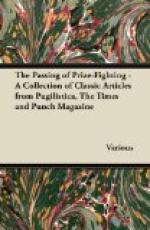[Illustration: The game of “Becky my Neighbour.” The Stout Knight lays low.]
I have not time to enumerate all the charming effects of the Opera, but I must not forget the magic property-harp, with, apparently, limp whip-cord strings, “the harp that once,” or several times, was played by those accomplished musicians, King Richard, and Friar Tuck, the latter of whom has by far the most taking song in the Opera, and which would have received a treble [or a baritone] encore, had Barkis—meaning Sir ARTHUR—“been willin’.” The contest between Richard and the Friar is decidedly “Dicky.” Nor must I forget the magnificent property supper in the first scene, at so much a head, where not a ham or a chicken is touched; nor must “the waits” between some of the sets be forgotten,—“waits” being so suggestive of music at the merriest time of the year. Nor, above all, must I omit to mention the principal character, Ivanhoe himself, played by Mr. BEN DAVIES, who would be quite an ideal Ivanhoe if he were not such a very real Ivanhoe—only, of course, we must not forget that he “doubles” the part. There is no thinness about “Ben Mio,” whether considered as a man, or as a good all-round tenor. I did not envy Ivanhoe’s marvellous power of sleep while Miss MACINTYRE was singing her best, her sweetest, and her loudest. For my part I prefer to believe that the crafty Saxon was “only purtendin’,” and was no more asleep than Josh Sedley on the eve of Waterloo, or the Fat Boy when he surprised Mr. Tupman and Aunt Rachel in the arbour, or when he pinched Mr. Pickwick’s leg in order to attract his attention. But, after all, Ivanhoe and Rowena, as THACKERAY remarked, are a poor namby-pamby pair, and the real heroine is Rebecca. The Opera ends with a “Rebecca Riot.” Every one wishes success to the new venture.




